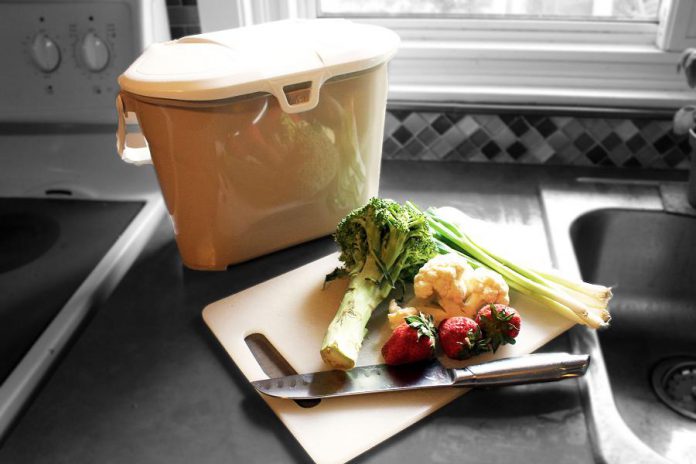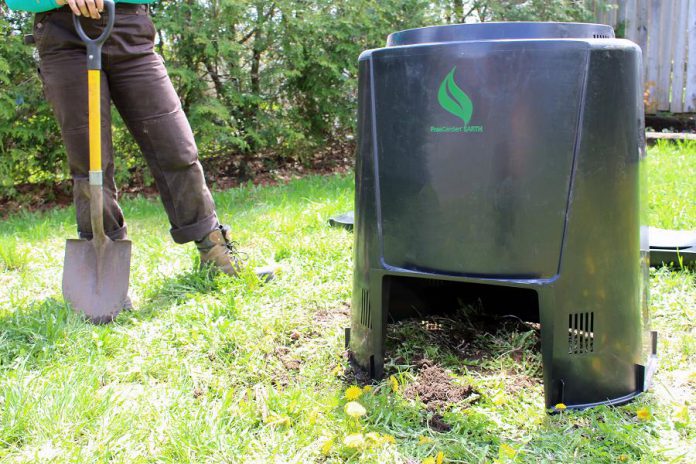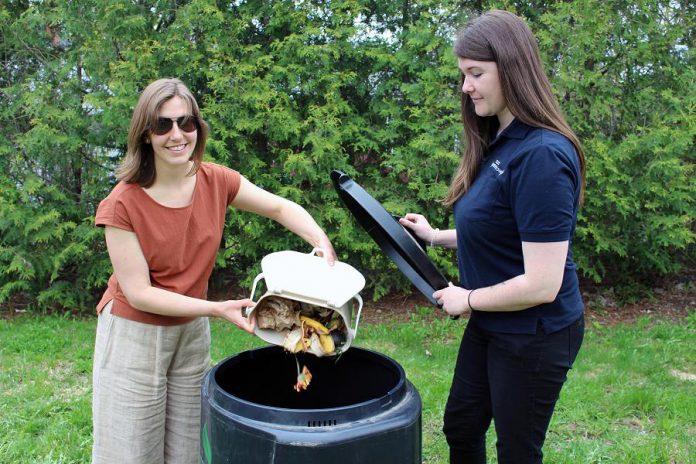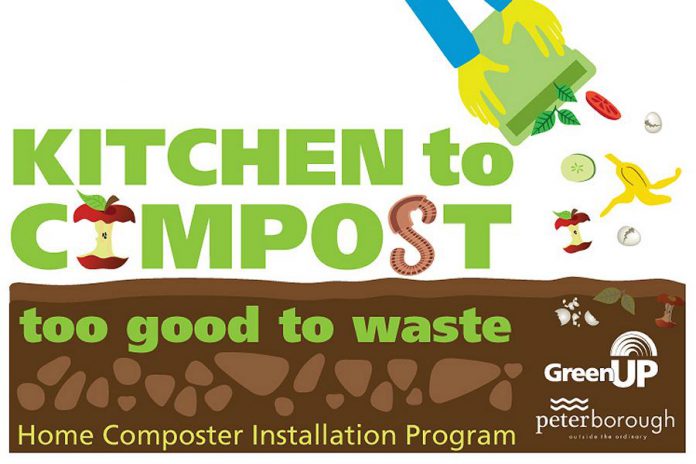
This May marked the start of the second year of “The Kitchen to Compost: Too Good To Waste” program offered by the City of Peterborough in partnership with GreenUP.
Program staff will install your very own composter and provide you with a countertop bin for compostable kitchen scraps — all for $35. A skilled installation team will answer your questions and boost your confidence while providing you with a comprehensive at-home workshop on compost care.
You can register and pay online, any time, at www.greenup.on.ca/program/kitchen-to-compost/. You must live within the City of Peterborough to be eligible for the program.
Last summer, the program installed more than 140 composters at Peterborough homes. This has direct benefits for the environment, one of biggest being that composting conserves landfill space.
Ontario’s landfills are filling up and composting not only reduces the volume of waste going to landfill, it also reduces the production of greenhouse gases. Specifically, methane gas emissions are lowered when less food waste is added to landfill.

Composting also completes the food cycle by returning plant scrap nutrients to the soil. Most farmers and avid gardeners will make soil amendments before planting for the season, and compost is a viable soil additive that can help enrich your garden beds with nutrients.
Many gardeners refer to compost as “black gold” mostly due to its dark earthy colour and nutrient-rich content that is a valuable addition to your beds. Compost not only adds nutrients to the soil but also saves water. Organic matter retains almost 20 times its weight in water, acting like a soil sponge.
Give composting a try. For those of you who are already composting but may be having trouble getting the results you desire, here are some tips about how to get your composter back on track and summer ready:
Prevent unwanted guests
To avoid unwanted guests, you will want to be sure to choose the right contents for your composter. To deter wildlife from snacking, do not put any meats, fats, or dairy products in your composter.
Be aware of what we call the nitrogen-to-carbon ratio, otherwise known as the greens and browns balance. A healthy composter should always have more browns (carbon) than greens (nitrogen). Greens are the waste items you bring from your kitchen, such as veggie scraps and coffee grounds, while the browns are yard-waste items such as grass clippings and collected leaves.
“Any food waste placed in your composter should be covered with browns such as leaves or a small amount of earth,” explains Peterborough waste diversion manager Virginia Swinson. “Since dry leaves are not readily available over the winter or even at this time of year, you can add shredded newspaper in their place. Cardboard egg cartons and recyclable paper towel can be used as well.”

If you have a persistent squirrel or raccoon, you can pestproof your composter. Swinson suggests using a heavy gauge mesh along the bottom opening of the composter.
“Dig a shallow hole around one inch deep in which to place your composter. Then backfill with the dirt you dug out and surround the perimeter with rocks.”
Avoid unpleasant odours
You may be interested in composting but are concerned about the potential for offensive odours.
However, unwanted smells can be avoided, both in your kitchen catcher and at the compost heap. Keep an eye on the moisture level in both areas to avoid any stinky scraps.
“If a composter gets too wet it may begin to smell,” Swinson says. “Again, make sure you have more browns — leaves, newspaper, cardboard — in your composter, which will keep the moisture balanced.”
If you are keeping your indoor food scraps in a countertop container, avoid placing it in the sun.
“If there is room, keep your kitchen catcher in the fridge, or a cool area under the counter, and line your indoor pail with newspaper or paper towel to absorb liquids. This will help eliminate indoor odours and pests such as fruit flies.”

Turn your compost weekly
Oxygen is also an important factor to consider in the process of compost breakdown.
Add oxygen to your composter by turning it once per week with a shovel or a pitchfork.
Once your compost is established, mix in newly added materials instead of layering. This will accelerate the process, providing you with nutrient-rich soil more quickly.
Be patient
Even with the proper care, it can take a composter six months to fully decompose your scraps into valuable soil. Temperature and moisture are limiting factors, even when you are doing everything right.
Don’t give up, even during those cold winter months when the process will likely slow down.
That rich “black gold” will be worth the wait and your plants will thank you for it.
Find out more
For more information about the Kitchen to Compost program, please email Megan Miller, the City of Peterborough’s Kitchen to Compost program facilitator, at kitchentocompost@peterborough.ca.
If you wish to install your own composter or need a second unit, the City and County of Peterborough provide composters to local residents for a nominal fee. These are available for City of Peterborough residents at the Materials Recycling Facility on Pido Road and at the GreenUP Store in downtown Peterborough at 378 Aylmer Street North.
Need more compost? Regardless of how much compost you produce at home, many gardeners are looking for even more “black gold” to add to their gardens. Small quantities can be purchased at GreenUP Ecology Park on a self-serve basis, from May through October.

























